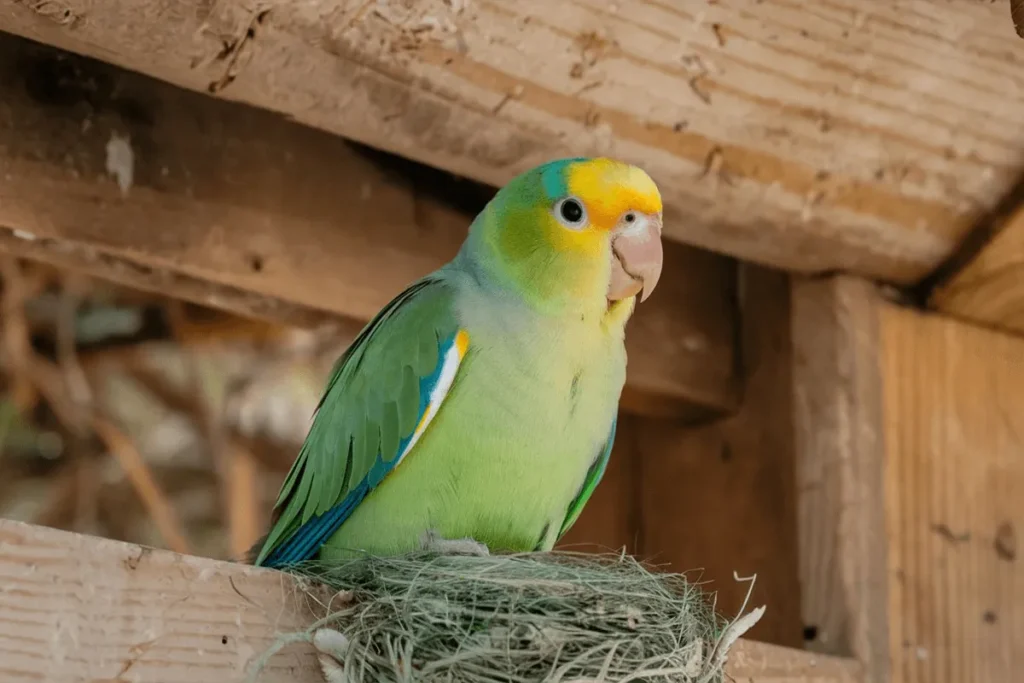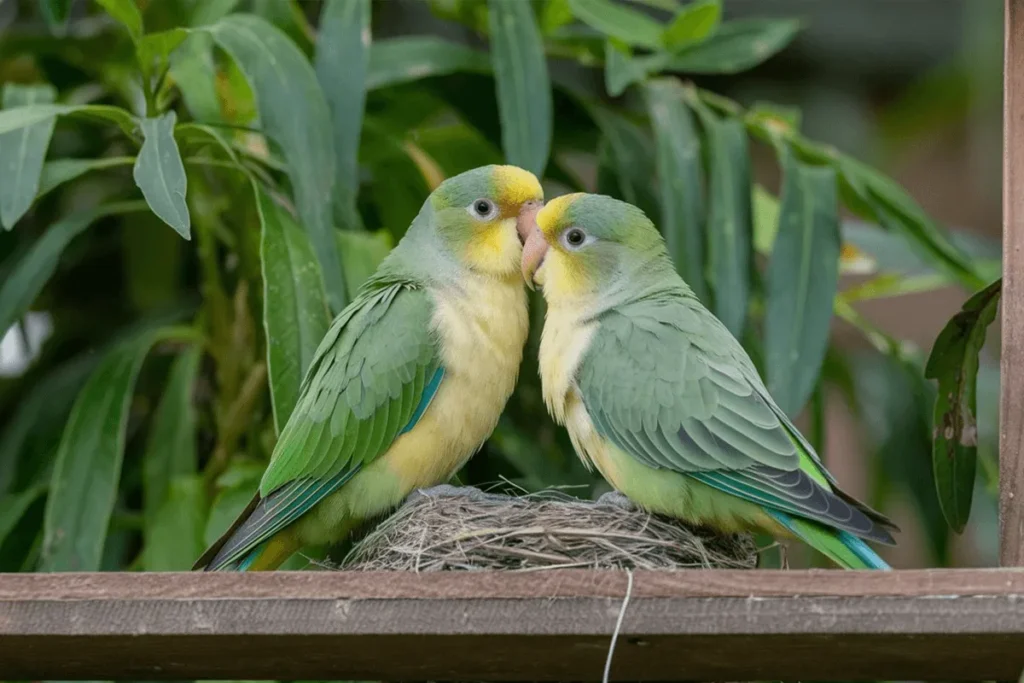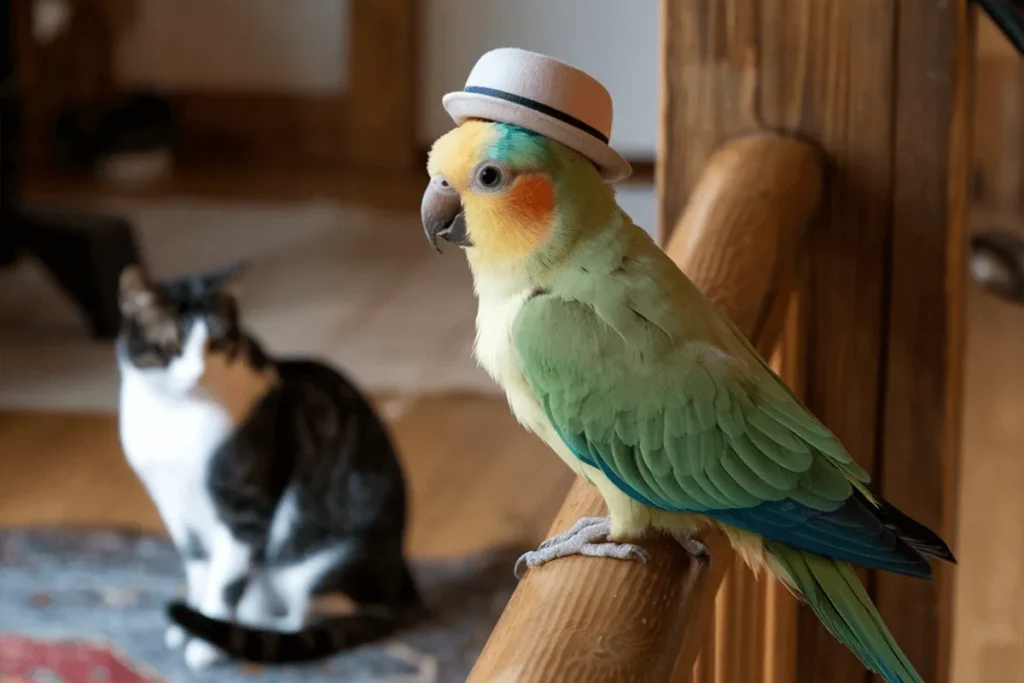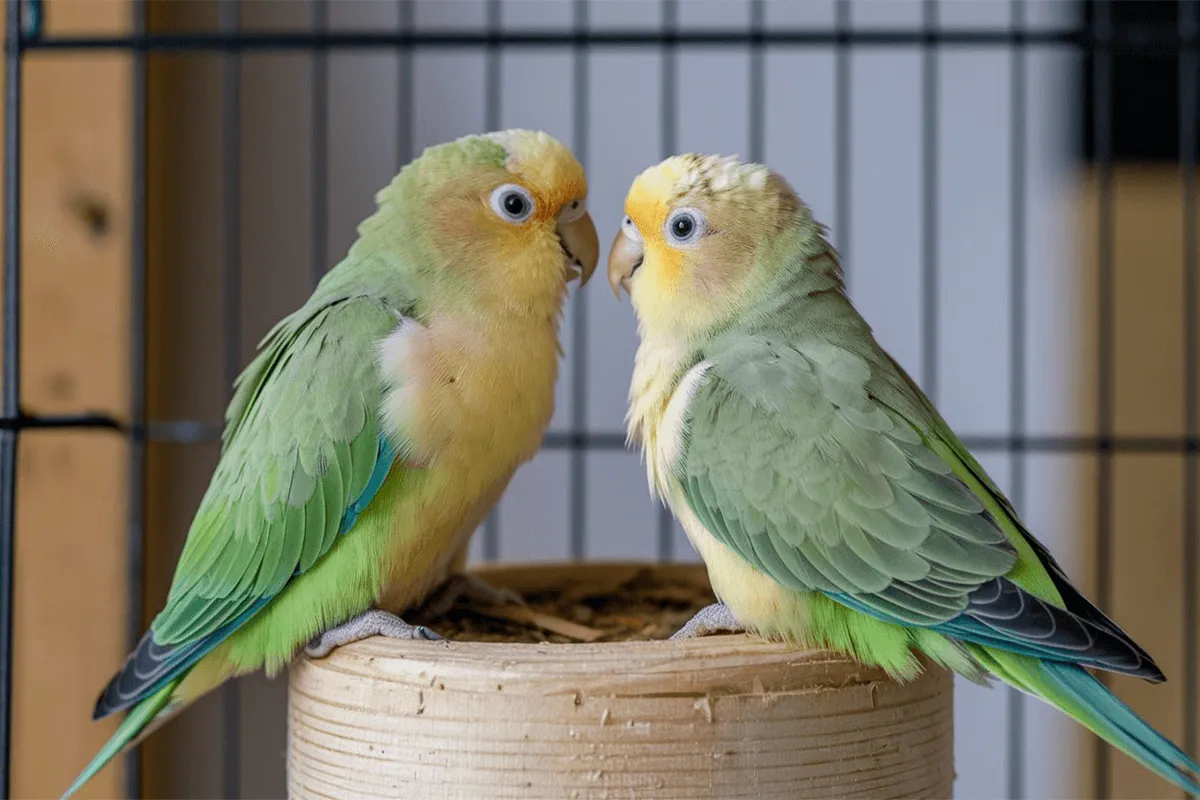Quaker parrot lifespan plays a crucial role in determining how long these charming and intelligent birds stay by your side. Also known as Monk Parakeets, Quaker parrots make wonderful companions due to their playful nature, strong personalities, and ability to mimic speech. With proper care, these small yet lively birds can live for decades, forming deep bonds with their owners.
Many factors influence a Quaker parrot’s lifespan, including diet, environment, healthcare, and mental stimulation. While some birds may only live 15 years, others thrive for 30 years or more when given the right care. Owners who prioritize a healthy lifestyle for their Quaker parrots can significantly extend their pet’s life and improve its overall well-being.
Understanding what contributes to a long and healthy life will help you provide the best possible care for your feathered friend. In this guide, you’ll learn how to maximize your Quaker parrot’s lifespan with proper nutrition, medical attention, environmental enrichment, and disease prevention. By following these expert-backed tips, you can ensure your beloved parrot enjoys a happy, active, and fulfilling life for many years.
How Long Do Quaker Parrots Live? Understanding Their Lifespan Expectancy
Average Lifespan
Quaker parrots live between 20 and 30 years when provided with proper care, but some well-cared-for birds reach their mid-30s. Genetics, diet, and overall lifestyle determine how long they thrive. Some Quaker parrots in suboptimal conditions barely reach 15 years, while those in enriched environments with high-quality food and regular veterinary checkups live much longer.
Owners who focus on nutrition, mental stimulation, and a stable routine greatly increase their Quaker parrot’s lifespan. These birds form strong emotional bonds with their owners, and stress-free, loving homes contribute to their longevity. Neglect, poor diet, and lack of veterinary care significantly reduce their lifespan, so creating a nurturing and stimulating environment remains essential for their well-being.
Wild vs. Captive Lifespan
Wild Quaker parrots rarely reach the same age as those in captivity due to natural predators, food scarcity, and environmental hazards. In the wild, these birds usually live around 15 years, facing threats from larger birds, extreme weather, and human intervention. Although wild Quaker parrots rely on instinct to survive, they often lack the medical attention and consistent nutrition that captive birds receive.
In captivity, Quaker parrots benefit from safe living conditions, nutritious diets, and regular health monitoring. Without the need to search for food or avoid predators, they experience a longer and healthier life. However, captivity presents its own challenges, such as obesity from lack of exercise or stress from inadequate mental stimulation. Owners who prioritize both physical and mental health ensure their Quaker parrots enjoy a lifespan that far exceeds their wild counterparts.
Parrot Lifespan Factors
Several key factors influence Quaker parrot lifespan, and understanding them helps owners provide the best care possible.
- Diet and Nutrition: A balanced diet plays the most crucial role in longevity. Fresh fruits, vegetables, high-quality pellets, and seeds keep Quaker parrots healthy, while processed or toxic foods shorten their lifespan.
- Veterinary Care: Regular checkups with an avian vet prevent diseases and detect potential health issues early. Without proper medical attention, undiagnosed illnesses can lead to a significantly shorter lifespan.
- Exercise and Mental Stimulation: Quaker parrots need daily physical activity and enrichment activities to prevent obesity and boredom. Lack of stimulation causes stress-related health issues, negatively impacting their lifespan.
- Living Environment: A clean, spacious cage with proper lighting and temperature control ensures their comfort. Exposure to toxins, such as non-stick cookware fumes or cigarette smoke, poses serious health risks.
- Social Interaction: These highly social birds need companionship and engagement to thrive. Isolation leads to stress, depression, and destructive behaviors that can shorten their lifespan.
Owners who address these factors with care and consistency give their Quaker parrots the best chance to live a long, happy, and healthy life.
Essential Quaker Parrot Care: The Key to a Long and Healthy Life
Providing a Safe and Comfortable Environment
Creating a safe and comfortable environment directly impacts Quaker parrot lifespan. These intelligent birds need a secure, spacious cage that allows them to move, stretch their wings, and explore. A cage should be at least 24x24x24 inches, with horizontal bars for climbing and enough space for multiple perches and toys. Placing the cage in a well-lit, draft-free area away from direct sunlight and kitchen fumes ensures a healthy living space.
Cleanliness plays a huge role in preventing illness. Owners should clean the cage, food and water dishes, and perches daily to remove bacteria and mold. Bedding should be replaced regularly to avoid respiratory issues caused by dust and droppings. Non-toxic materials in perches and toys keep Quaker parrots safe from accidental poisoning or injuries.
Safety extends beyond the cage. Keeping electrical cords, ceiling fans, and toxic plants out of reach prevents accidents. Quaker parrots love to explore, so supervising them during out-of-cage time keeps them from chewing on dangerous objects. A well-maintained, bird-friendly environment keeps them healthy and increases their lifespan.

Socialization and Mental Stimulation
Quaker parrots thrive on social interaction and mental engagement. As highly intelligent and social birds, they need daily companionship and enrichment activities to prevent boredom, stress, and behavioral problems. A lonely or unstimulated Quaker parrot may become depressed, leading to feather plucking, excessive screaming, or self-harm, all of which negatively impact lifespan.
Engaging with your Quaker parrot through talking, training, and playing strengthens your bond and improves their mental health. These birds love learning tricks, solving puzzles, and mimicking sounds. Providing enrichment activities like foraging toys, climbing structures, and mirrors keeps their minds active and prevents cognitive decline.
Socialization extends beyond human interaction. If possible, having another Quaker parrot as a companion can provide a sense of security and emotional fulfillment. However, proper introductions and monitoring ensure they get along. A mentally stimulated and socially engaged Quaker parrot stays happy, reducing stress-related illnesses and increasing their lifespan.
Regular Health Checkups
Routine vet visits play a vital role in extending Quaker parrot lifespan. Many bird illnesses show subtle or no symptoms until they become severe, making preventive care essential. An avian vet specializes in diagnosing and treating bird-specific health issues, ensuring early detection of potential problems.
Owners should schedule annual wellness exams to check for common health concerns like respiratory infections, digestive disorders, and nutritional deficiencies. Blood tests and fecal exams help detect infections or underlying diseases. In addition to checkups, monitoring weight, feather condition, and behavior at home provides early warning signs of illness.
Signs of illness, such as lethargy, loss of appetite, or changes in droppings, require immediate veterinary attention. Neglecting medical care significantly shortens lifespan, while proactive health management helps Quaker parrots live longer, healthier lives. Providing a combination of professional veterinary care, daily health monitoring, and a clean, stress-free environment ensures your bird remains in top condition for years to come.
Quaker Parrot Diet: The Secret to a Healthy Parrot Lifestyle
Balanced Diet for Longevity
A well-balanced diet plays the most critical role in extending Quaker parrot lifespan. Proper nutrition ensures a strong immune system, prevents common health issues, and supports overall well-being. In the wild, Quaker parrots eat a diverse diet that includes seeds, fruits, vegetables, and grains. Replicating this variety in captivity helps them thrive.
High-quality pellets should make up about 60-70% of their diet since they provide essential vitamins and minerals. Fresh vegetables like carrots, bell peppers, leafy greens, and broccoli add important nutrients and antioxidants. Fruits such as apples, bananas, and berries offer natural sugars but should be fed in moderation to prevent excess sugar intake. A small portion of seeds and nuts provides healthy fats, but too much can lead to obesity.
Offering a mix of fresh and natural foods keeps your Quaker parrot engaged with meals while promoting long-term health. Avoid an all-seed diet, as it lacks key nutrients and leads to deficiencies that shorten lifespan. Rotating foods regularly ensures they receive a variety of essential nutrients while preventing boredom with their diet.

Foods to Avoid
Some foods pose serious health risks and should never be part of a Quaker parrot’s diet. Owners must recognize toxic foods to prevent accidental poisoning, digestive issues, or even fatal reactions.
- Chocolate and Caffeine – These contain theobromine and caffeine, which cause heart irregularities and nervous system damage.
- Avocado – The persin in avocado is highly toxic and can lead to respiratory failure.
- Onions and Garlic – These cause digestive upset and damage red blood cells, leading to anemia.
- Alcohol and Carbonated Drinks – Even small amounts can cause organ failure and immediate health issues.
- Salt and Sugary Foods – Excess salt dehydrates birds, and too much sugar increases the risk of obesity and diabetes.
In addition to these toxic foods, avoid feeding processed or fried foods. Artificial preservatives, dyes, and excess fats strain the digestive system and negatively affect Quaker parrot lifespan. Always double-check ingredients before offering any human food, and stick to natural, bird-safe options.
Hydration and Supplements
Proper hydration keeps Quaker parrots healthy and energetic. Always provide fresh, clean water in a sturdy dish or water bottle, changing it daily to prevent bacterial growth. In warmer climates or during the summer, birds may need more water to stay hydrated, so monitor their intake closely. Dehydration leads to serious health problems, including kidney issues and digestive blockages.
Some Quaker parrots benefit from calcium supplements, especially if they don’t get enough from their diet. Cuttlebones, mineral blocks, or crushed eggshells provide extra calcium for strong bones and healthy beaks. Vitamin D supplements may be necessary if a parrot doesn’t get enough natural sunlight, as this vitamin helps with calcium absorption.
Probiotics support digestive health by maintaining a balanced gut microbiome, particularly after an illness or antibiotic treatment. However, always consult an avian vet before adding supplements to a Quaker parrot’s diet to ensure proper dosage and necessity. By focusing on hydration and essential nutrients, owners can prevent deficiencies and promote a long, healthy life for their birds.
Common Parrot Diseases and How to Prevent Them
Psittacosis and Respiratory Issues
Psittacosis, also known as parrot fever, poses a serious health threat to Quaker parrots and significantly impacts their lifespan if left untreated. A bacterial infection caused by Chlamydia psittaci, this disease spreads through airborne particles from droppings, feathers, and nasal discharge. Affected birds often show symptoms like lethargy, nasal discharge, difficulty breathing, and loss of appetite.
Respiratory issues in Quaker parrots stem from poor air quality, bacterial infections, or exposure to toxins. Fumes from non-stick cookware, cigarette smoke, aerosol sprays, and scented candles cause severe respiratory distress. Keeping their environment well-ventilated and free from harmful airborne substances prevents lung damage and disease.
Owners should monitor for early signs of respiratory distress, such as tail bobbing, wheezing, or excessive sneezing. Immediate veterinary care ensures proper diagnosis and treatment with antibiotics, increasing the chances of recovery. Regular cage cleaning and avoiding overcrowding help reduce the risk of infections spreading, ensuring a healthier living space for your bird.
Nutritional Deficiencies
A poor diet leads to serious health problems and shortens Quaker parrot lifespan. Nutritional deficiencies cause weak bones, feather problems, organ failure, and a weakened immune system, making birds more vulnerable to disease.
Calcium deficiency results in weak bones, brittle beaks, and egg-binding in female parrots. Offering cuttlebones, mineral blocks, and dark leafy greens prevents this issue. Vitamin A deficiency causes respiratory infections, dull feathers, and poor eyesight. Foods like carrots, sweet potatoes, and red bell peppers provide natural sources of vitamin A.
An all-seed diet leads to fatty liver disease, obesity, and heart problems. Birds fed excessive seeds lack essential vitamins and minerals found in fresh vegetables and high-quality pellets. Owners must ensure a balanced diet to avoid these life-threatening conditions. Regularly introducing a variety of fresh foods prevents deficiencies and promotes long-term health.
Feather Plucking and Stress-Related Issues
Feather plucking signals stress, boredom, or underlying health problems in Quaker parrots. A bird that constantly pulls out its feathers may suffer from anxiety, improper diet, skin infections, or lack of mental stimulation. Without intervention, this behavior escalates, leading to severe feather loss, skin damage, and infections.
Stress negatively impacts Quaker parrot lifespan, weakening the immune system and increasing susceptibility to disease. Lack of social interaction, sudden environmental changes, and poor cage conditions contribute to stress-related problems. Birds need daily socialization, a consistent routine, and a stimulating environment to feel secure.
Providing enrichment activities, such as puzzle toys, foraging games, and climbing structures, helps keep them mentally engaged. Regular out-of-cage time and positive human interaction reduce stress and prevent behavioral issues. Identifying and eliminating stressors, whether loneliness, loud noises, or improper lighting, ensures a happy, healthy bird.
By addressing these common health concerns early, owners can prevent serious complications and help their Quaker parrots live longer, more fulfilling lives.
Tips to Increase Your Quaker Parrot’s Lifespan
Daily Exercise and Playtime
Physical activity plays a crucial role in maintaining Quaker parrot lifespan. These energetic birds need daily exercise to stay fit, prevent obesity, and promote overall well-being. Without enough movement, Quaker parrots develop weight-related health issues such as fatty liver disease and heart problems, which can significantly shorten their lifespan.
Owners should provide at least two to three hours of supervised out-of-cage time daily. Allowing them to fly strengthens their muscles, improves circulation, and keeps their respiratory system healthy. For birds with clipped wings, climbing, walking, and interactive play still provide essential movement.
Toys play a major role in encouraging exercise. Climbing ropes, swings, ladders, and foraging toys keep Quaker parrots physically engaged while also stimulating their minds. Training sessions that involve flying between perches or retrieving objects add both mental and physical challenges. A bird that gets regular exercise stays active, avoids health complications, and enjoys a longer, happier life.

A Consistent Routine
Quaker parrots thrive on routine, and a stable daily schedule reduces stress, which directly impacts lifespan. Unexpected changes in their environment or daily activities cause anxiety, leading to behavioral problems like excessive screaming, feather plucking, or loss of appetite. Birds feel more secure when they know what to expect each day.
A consistent feeding schedule ensures proper digestion and balanced nutrition. Feeding your parrot at the same times each day prevents unnecessary stress and promotes healthy eating habits. Regular wake-up and bedtime hours also regulate their sleep cycle, which is crucial for maintaining strong immunity and overall health.
Owners should dedicate daily time for socialization, training, and play to strengthen their bond with their parrot. Predictable interactions help build trust and prevent behavioral issues caused by loneliness or neglect. A Quaker parrot that feels safe and emotionally secure enjoys a longer, more fulfilling life.
Safe and Loving Environment
A Quaker parrot’s surroundings influence its health and longevity. Providing a safe, loving home eliminates many risks that could shorten their lifespan. These birds form strong bonds with their owners and need a nurturing environment to thrive.
Ensuring a bird-proofed home prevents accidents and toxic exposure. Non-stick cookware emits dangerous fumes that can be fatal to birds, and household cleaners, air fresheners, and cigarette smoke harm their respiratory system. Electrical cords, ceiling fans, and open windows pose physical dangers, so owners must take precautions during out-of-cage time.
Emotional well-being also affects lifespan. Quaker parrots need affection, interaction, and positive reinforcement to stay happy. Birds that feel neglected or unwanted often develop depression, which leads to health deterioration. Regular conversation, gentle handling, and positive attention create a loving environment where the bird feels secure.
By combining physical safety, emotional security, and consistent care, owners can help their Quaker parrot live a long, happy, and healthy life.
Conclusion
Maximizing Quaker parrot lifespan requires commitment, knowledge, and daily care. These intelligent and affectionate birds can live up to 30 years or more when given the right environment, nutrition, and medical attention. Owners who prioritize a balanced diet, regular exercise, and mental stimulation significantly improve their Quaker parrot’s quality of life while extending its years.
Providing a safe and comfortable home remains one of the most important factors in increasing Quaker parrot lifespan. Keeping their cage clean, placing it in a stress-free location, and eliminating household hazards like toxic fumes and unsafe objects prevent common health risks. Daily socialization and a structured routine reduce anxiety and create a strong bond between the parrot and its owner, ensuring emotional well-being.
Health monitoring plays a key role in maintaining a long lifespan. Owners who schedule regular checkups with an avian vet, recognize early signs of illness, and seek medical treatment when needed help their Quaker parrots avoid preventable diseases. Common health issues, such as respiratory infections, nutritional deficiencies, and stress-related problems, become manageable with proactive care.
By focusing on proper nutrition, consistent exercise, mental enrichment, and a loving environment, owners give their Quaker parrots the best chance to live a long and fulfilling life. Every effort put into their care directly impacts Quaker parrot lifespan, ensuring these wonderful companions stay healthy and happy for decades. Taking small but meaningful steps every day will allow your feathered friend to thrive and enjoy a lifetime of love and companionship.
You Can Read more about This Bird “Quaker Parrot” in This Article.
Learn More about Pets and Adoption From HERE!
Find Some Good stuff for your Pet On Pet MD Official
